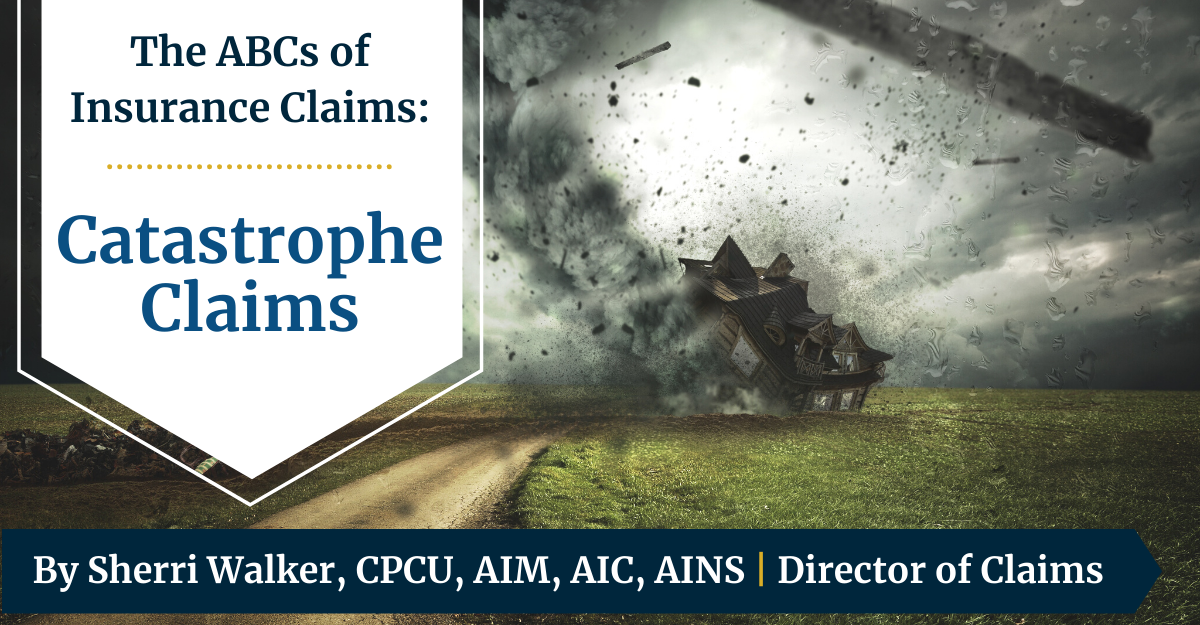Welcome to the ABCs of Insurance Claims. Over the next few months, Sherri Walker, Sentinel’s Director of Claims will address an aspect of claims handling for every letter of the alphabet to help provide a better understanding of the claims process.
CAT Duty
There are few things that truly stir up seasoned adjusters and strike a chord of fear in newer ones like an urgent weather update during storm season. Somewhere along the way, I have lost track of how many hours I spent watching Jim Cantore on the Weather Channel, wondering whether it was time to start packing to head into the storm ravaged areas.
This trek, known as “CAT duty,” is many things – exhausting, heart wrenching, intense – but also one of the most rewarding times as an adjuster. To be able to truly help victims of a catastrophe put their lives back in order is what makes so many adjusters sign up yearly to be deployed during those times.
Catastrophe claims have their own unique flow, including a sense of urgency not usually found in a typical car accident or minor property claim. Many times, following a catastrophe, adjusters will set up a route to look at multiple properties back-to-back throughout the day and spend the evening hours preparing estimates and claim payment checks, just to head back out and do it again the next day. While adjusters are working through as many claims as possible, there are things you should know to assist the adjuster and get your claim processed quickly.
Know Your Policy
It is important to understand a few key things about how your policy may respond to Catastrophe claims. For the purpose of this discussion, we will address storm related events, but there are other types of catastrophic claims to be aware of – wildfire, earthquake, tsunami, and mudslide are all additional examples.
Many policies carry a different deductible for named storms such as hurricanes or tropical storms. These deductibles can either be a stated dollar amount or a percentage deductible. Ahead of storm season, it is a good idea to review your policy carefully and make sure that you are not surprised by a much larger deductible than you were prepared for. If your policy does carry a large deductible for these perils, you may have the option to purchase a Deductible Buy Down policy, which will cover a portion of the deductible your mainline policy requires.
Policy Exclusions
Additionally, it is important to know that some storm related damages, such as flood and storm surge, are excluded under your mainline policy. If you own property in a storm prone area, you should consider purchasing flood coverage. Flood may be mandatory as part of your mortgage based on the location of that property, but even if the bank has not mandated coverage, all locations are in a flood zone and should entertain coverage.
Some policies in coastal areas also have a Wind/Hail exclusion on the mainline policy, and that coverage can potentially be underwritten by the Joint Underwriters Association (JUA) or other specialty insurers in your state.
Prepare for a Catastrophe
At least once a year, and especially ahead of the start of storm season on June 1st, it is a good idea to do a video walk through recording all property subject to loss. This documents the condition of the property prior to a catastrophe, as well as providing an idea of the contents that you own, room by room.
If your property is severely damaged and your personal property is no longer present, this will help when the time comes to make a schedule of damaged or missing contents, as well as allow your adjuster to see what type and quality of finishes (such as light fixtures, moldings & cabinetry) were present.
Should a storm cause damage to your home that renders it non-livable, it is important to keep a record of expenditures that you may be claiming, such as a hotel, pet boarding or supplies to tarp a damaged roof or board windows. This can be done as simply as snapping a picture of the receipt with your phone.
It is also a good idea to make sure that you have your insurance policy number readily available, as well as the phone number to report a claim. This can be saved in your phone contacts for ease of access when you need it quickly.
The Sentinel Team
As we are entering storm season, catastrophe claims are unfortunately bound to happen. Being prepared, knowing who to reach out to, and understanding how your policy will respond are key to getting back on track quickly after a catastrophe.
For more resources on weathering the storm, please make sure to visit our storm center at sentinelra.com/storm-center. Here you will find information on forecasted storms as well as tips on preparing a storm kit, reporting a claim, and recovery if you are impacted.
As always, Sentinel’s team of professionals stand ready to assist you in reviewing your policies and making sure you are adequately covered, even for catastrophes.


